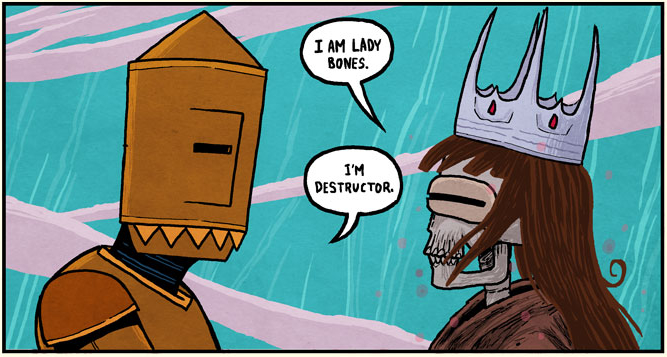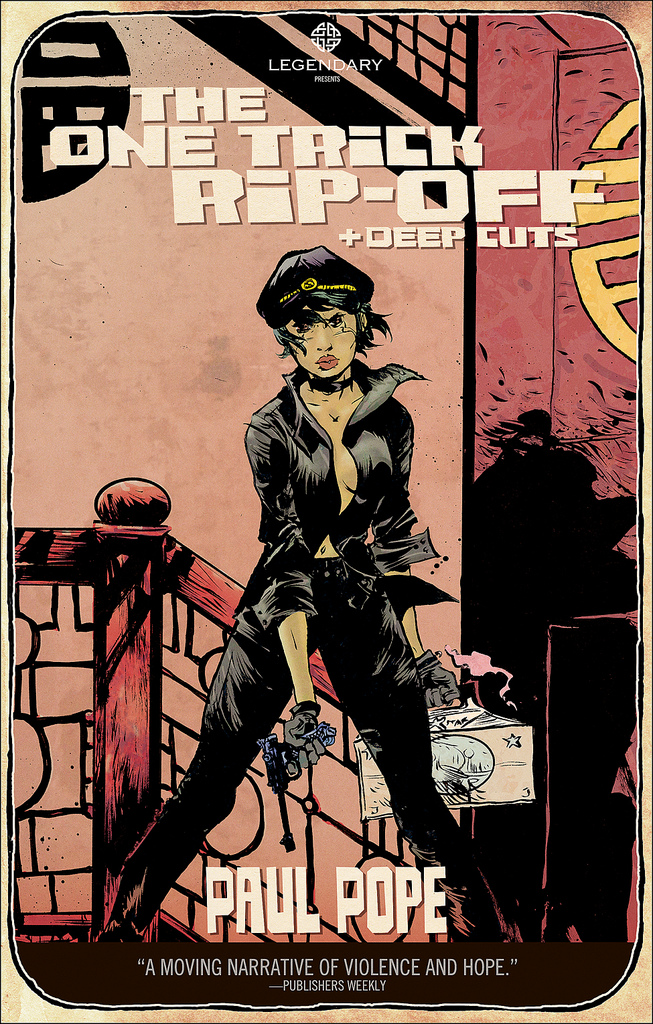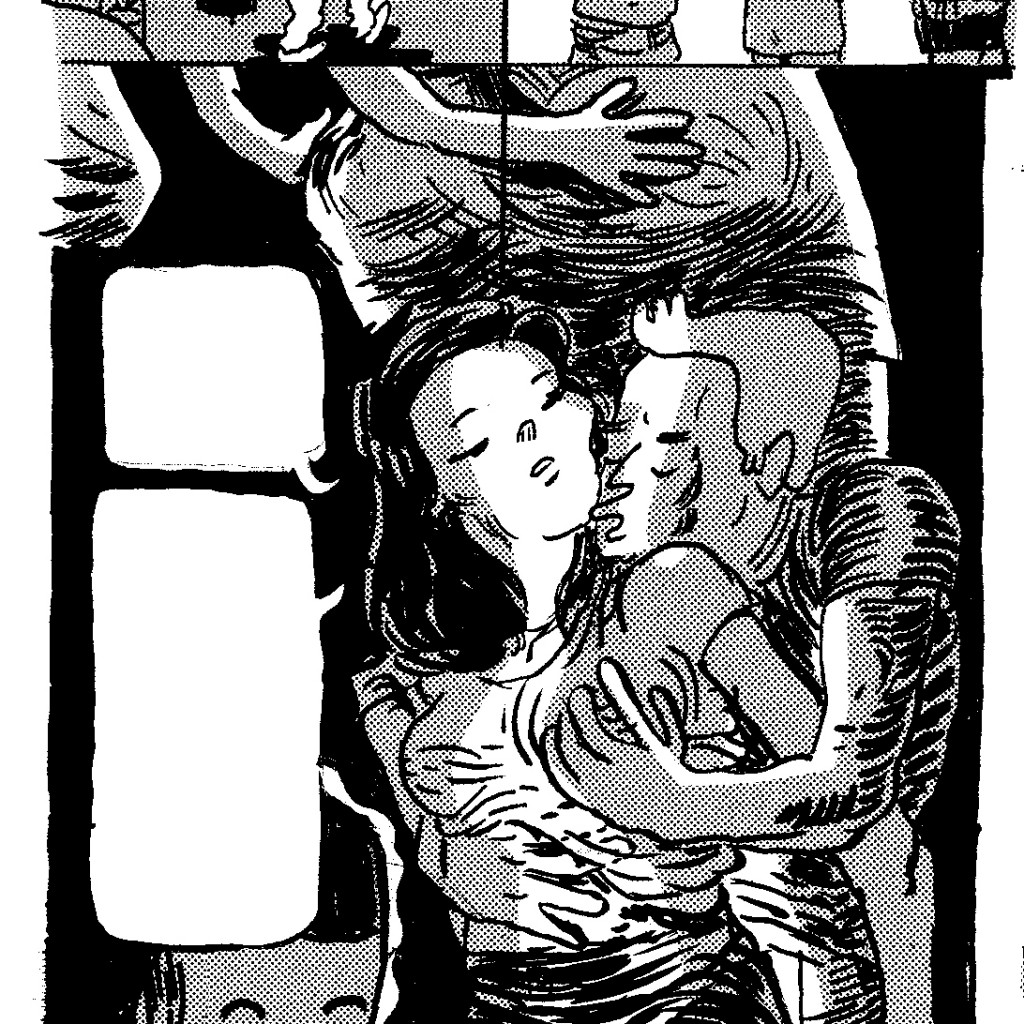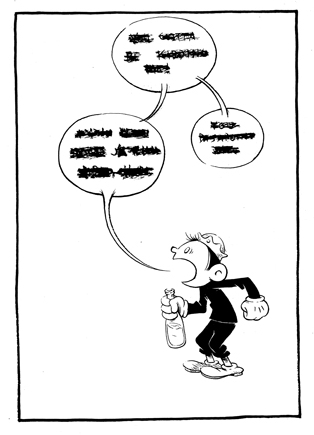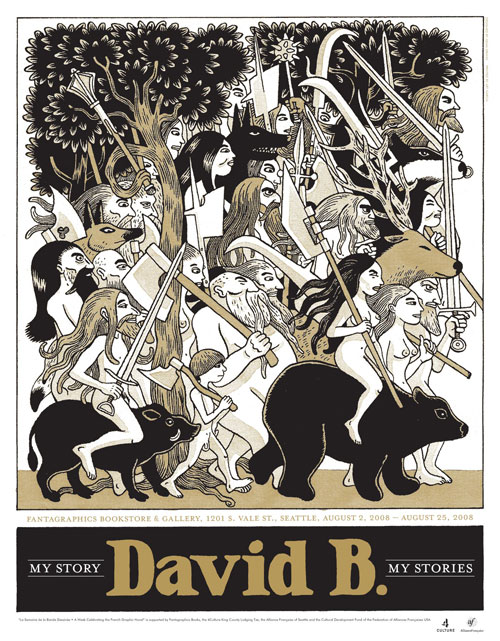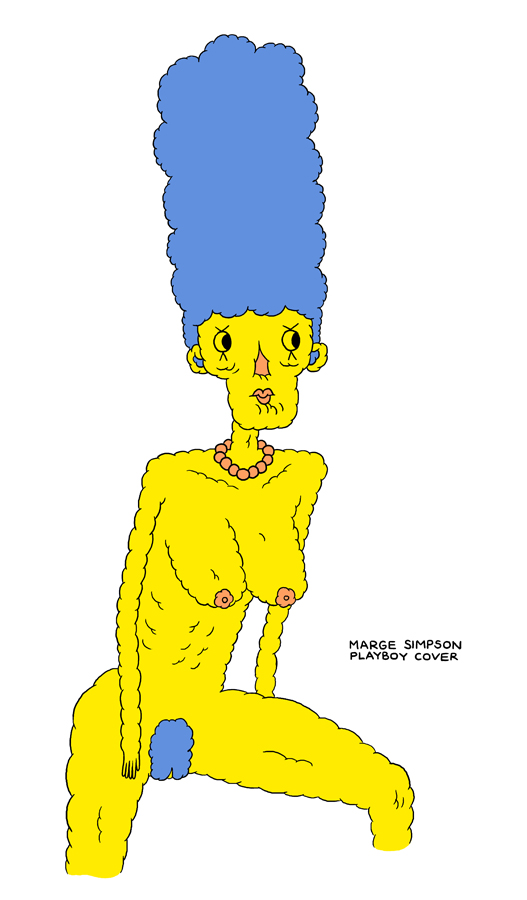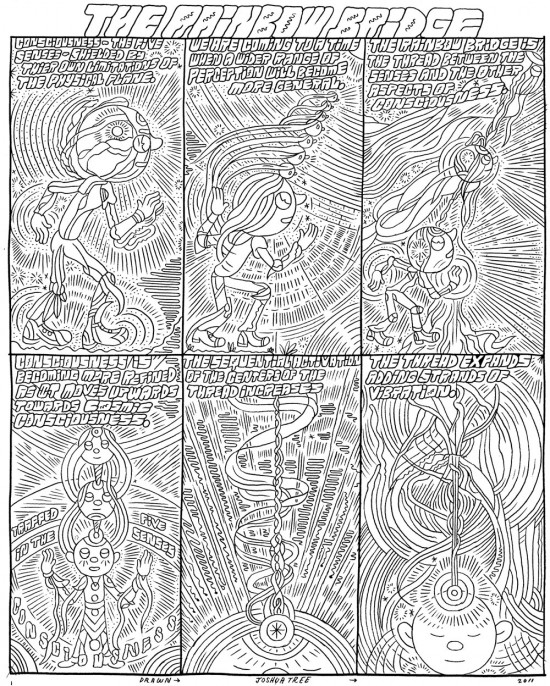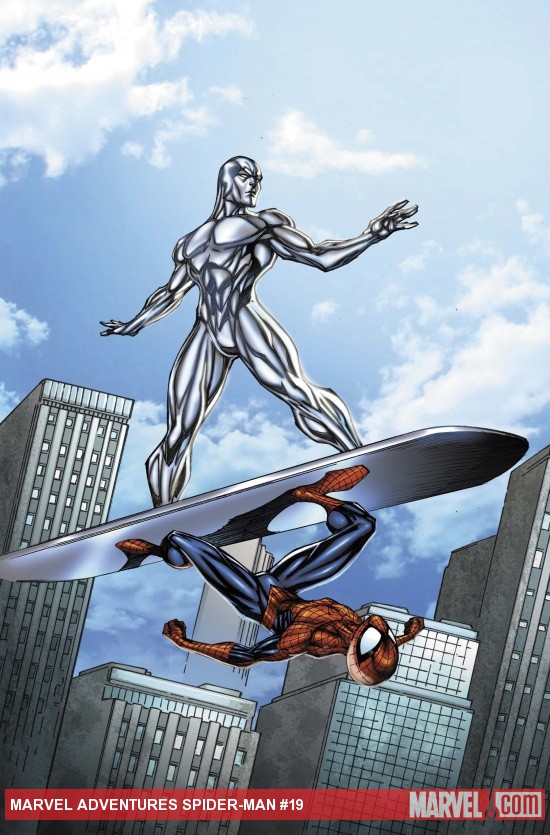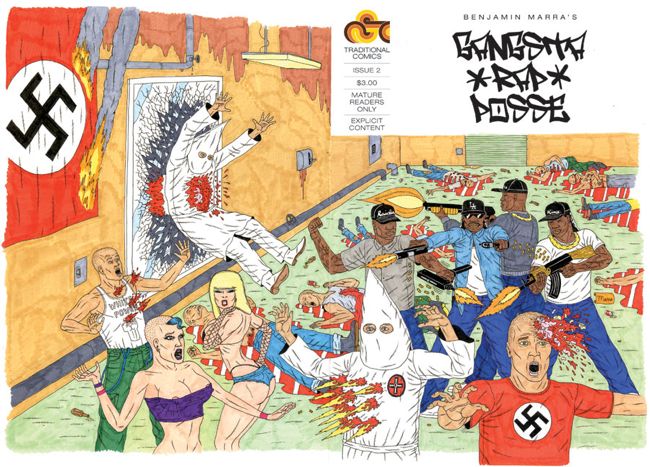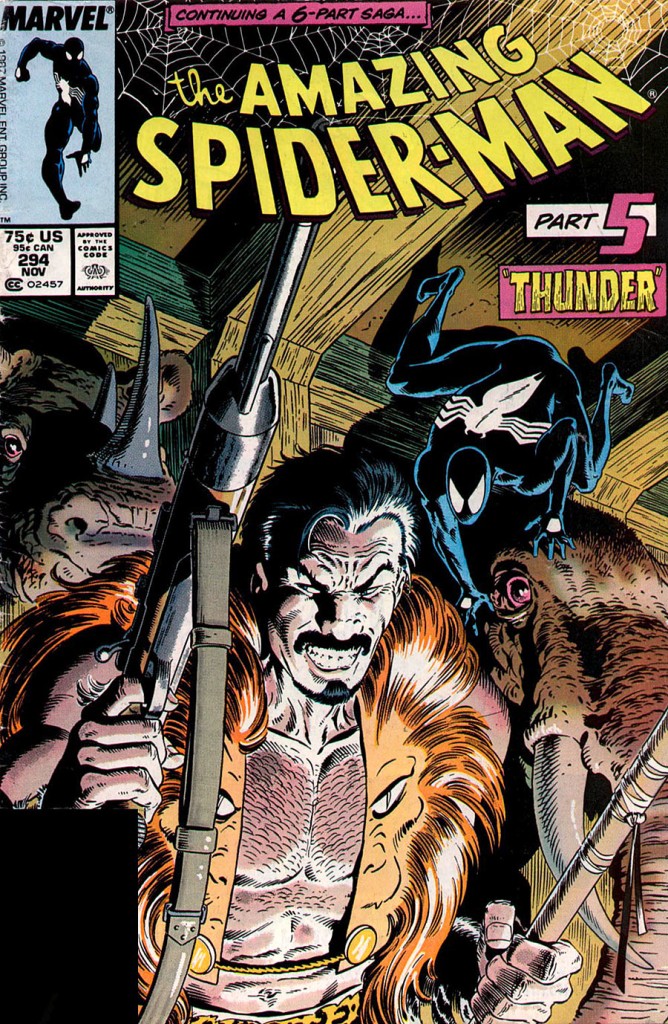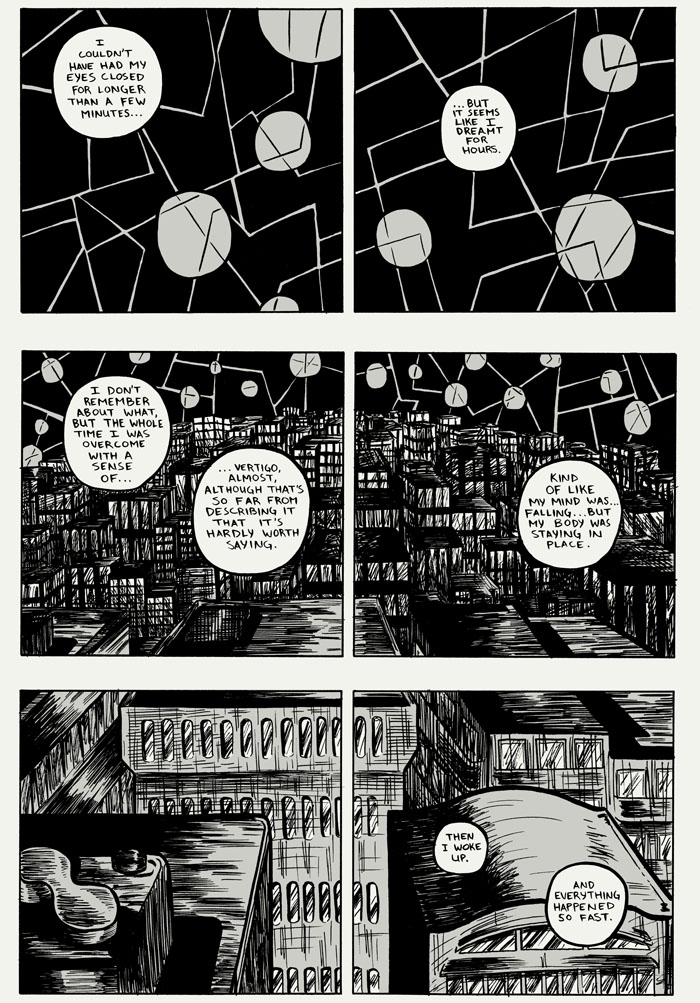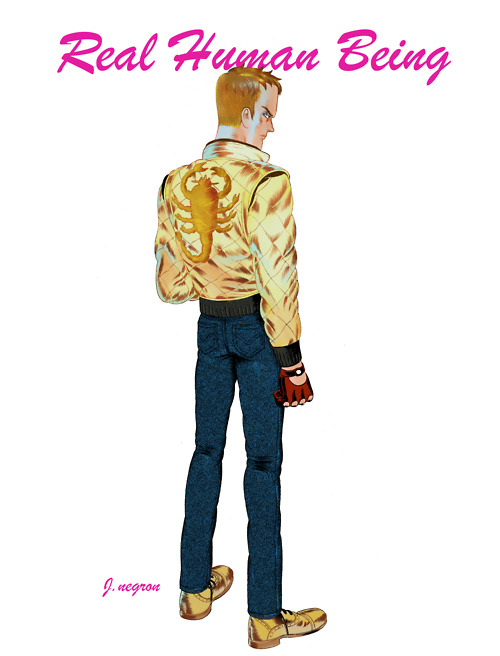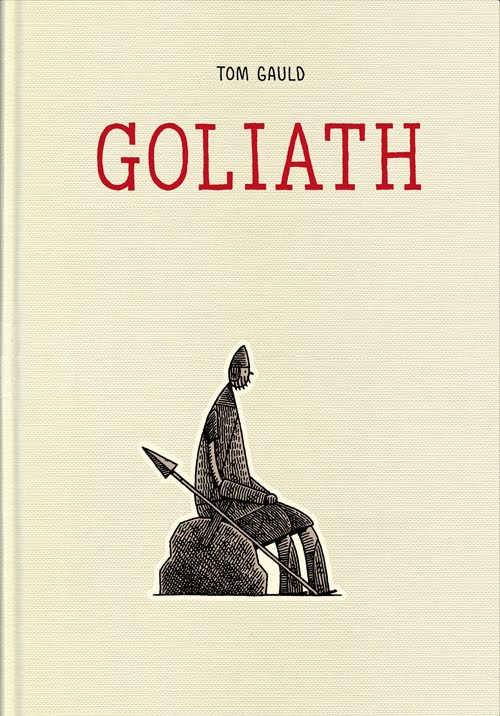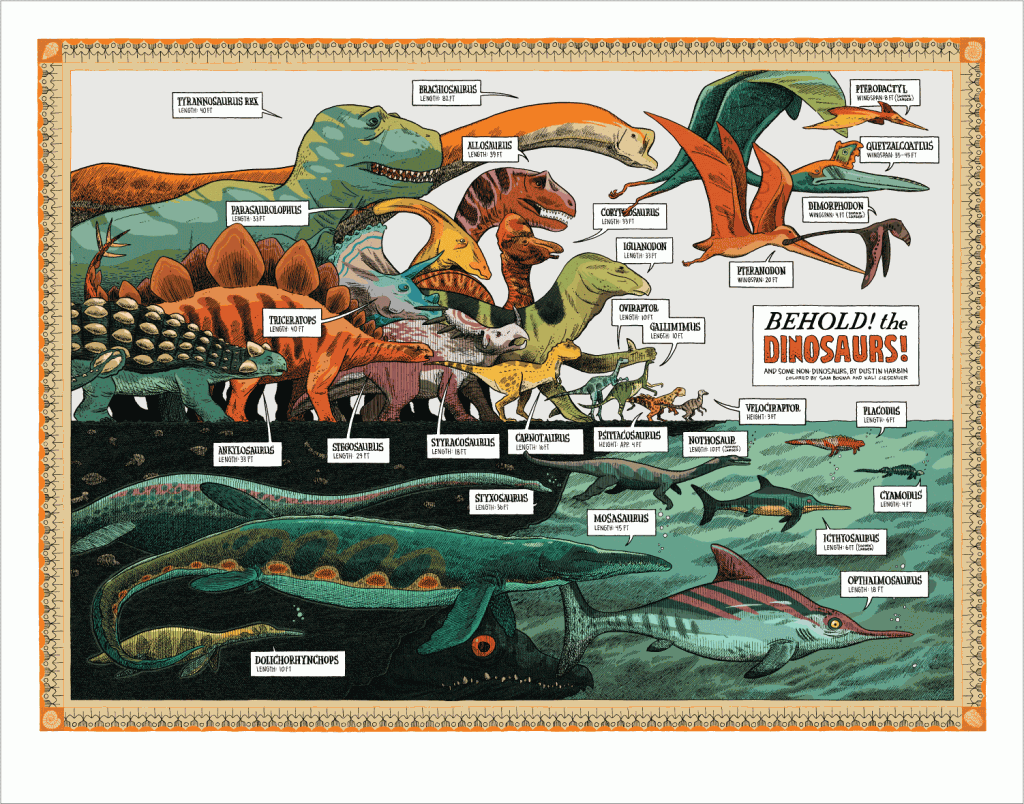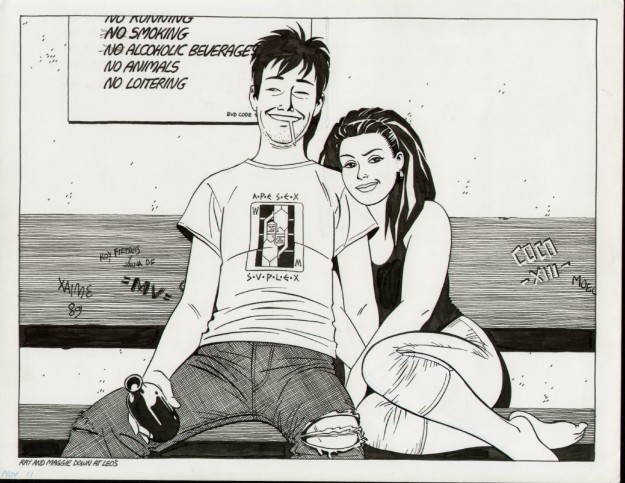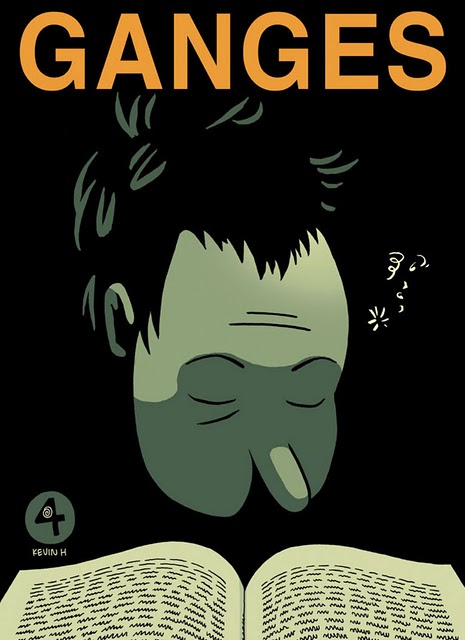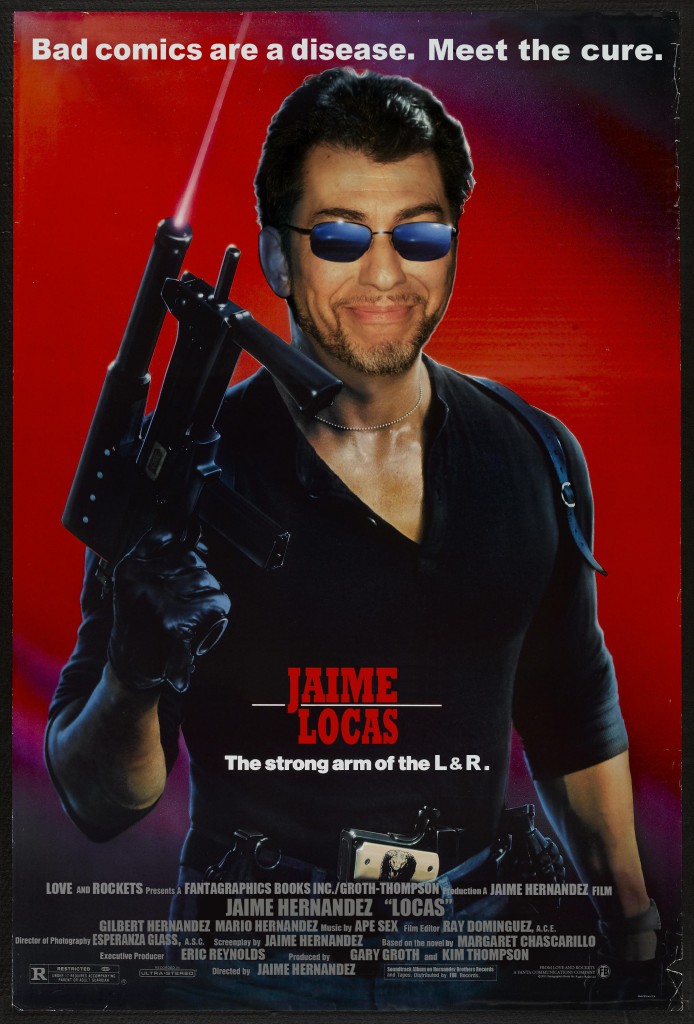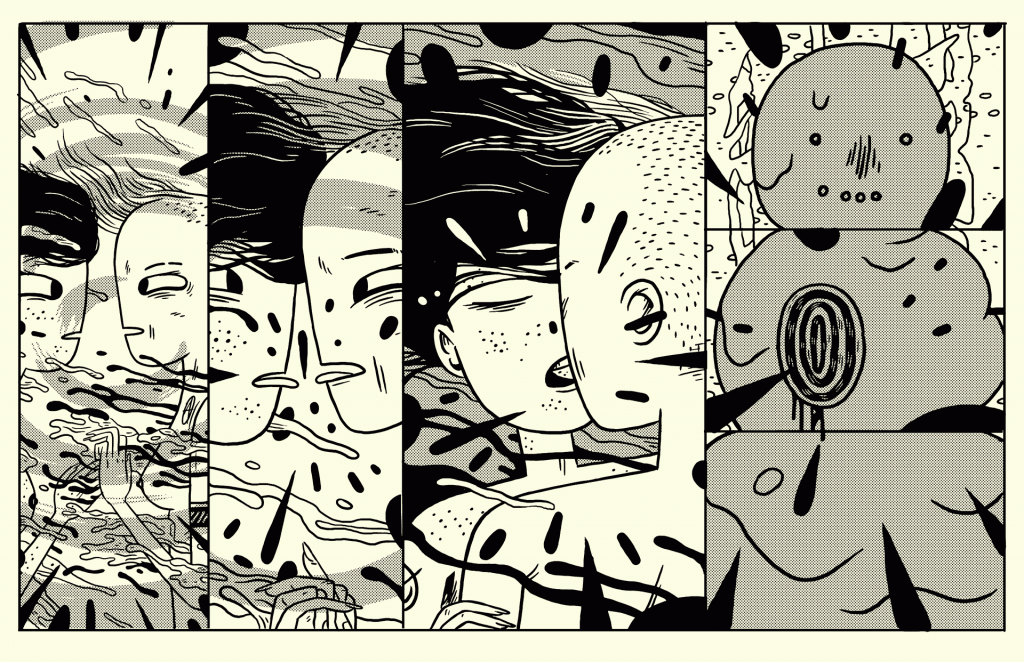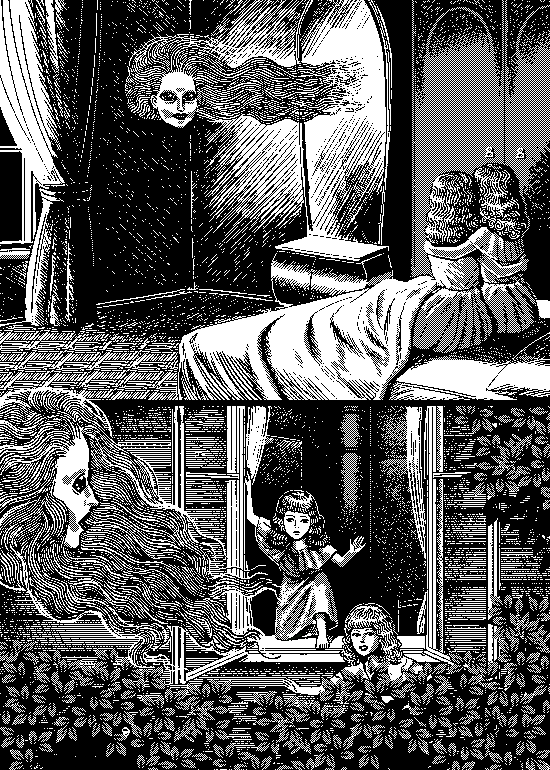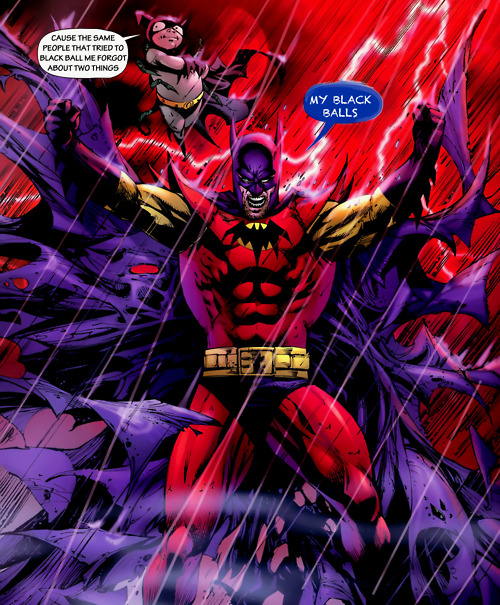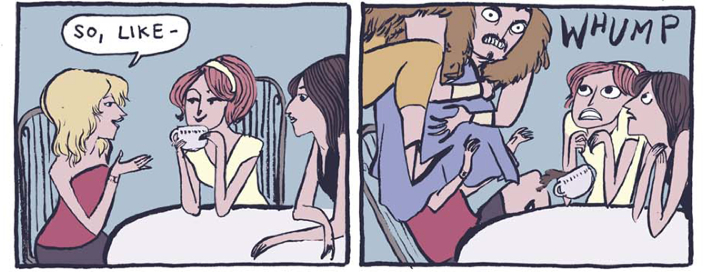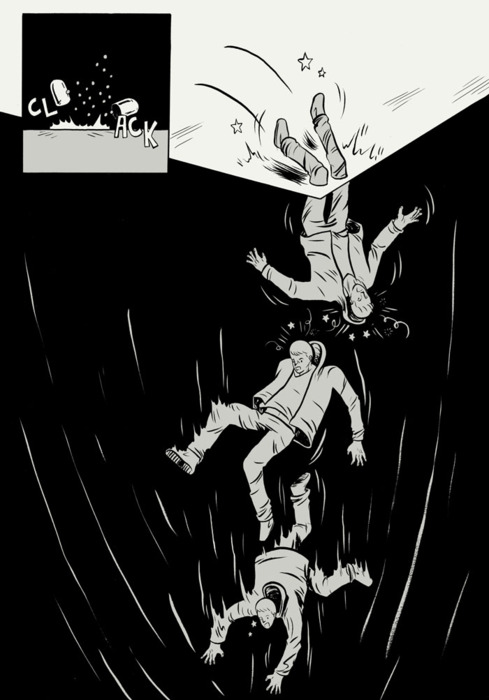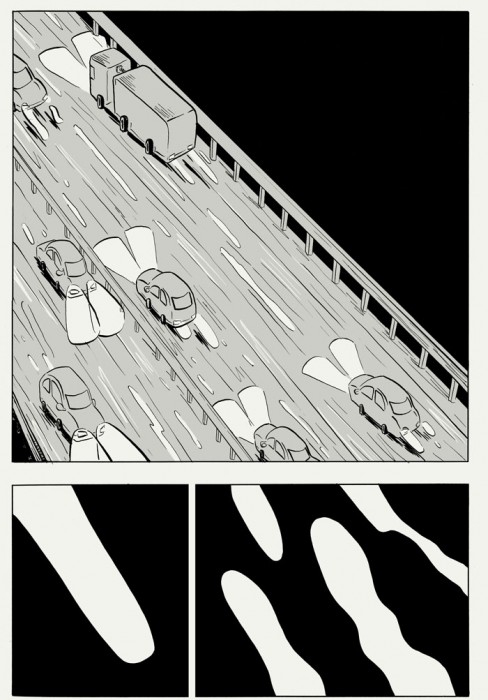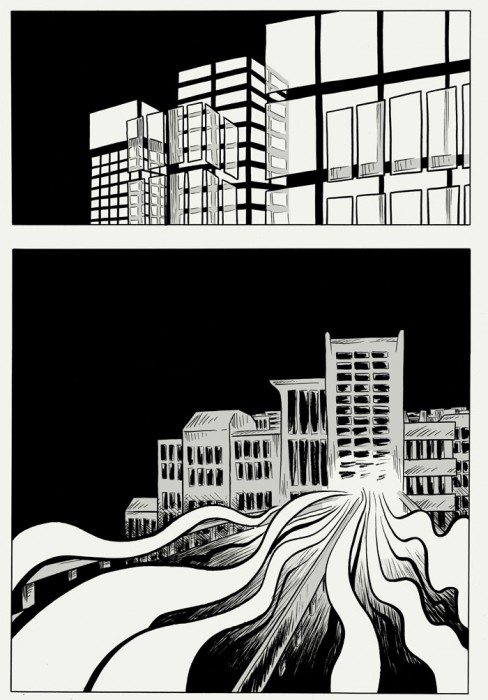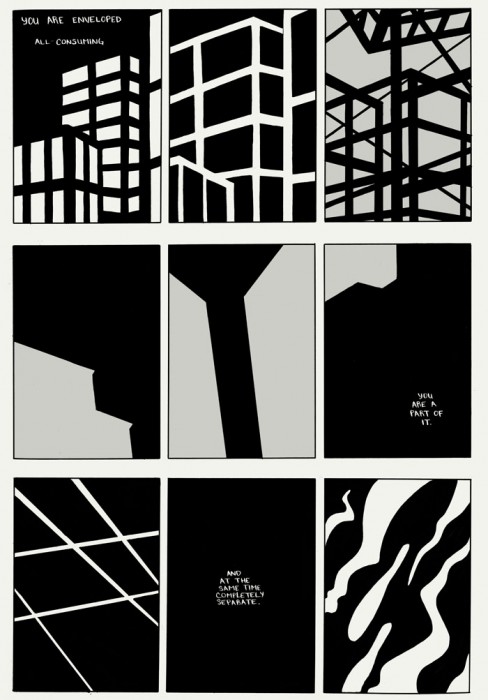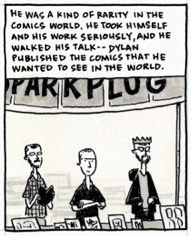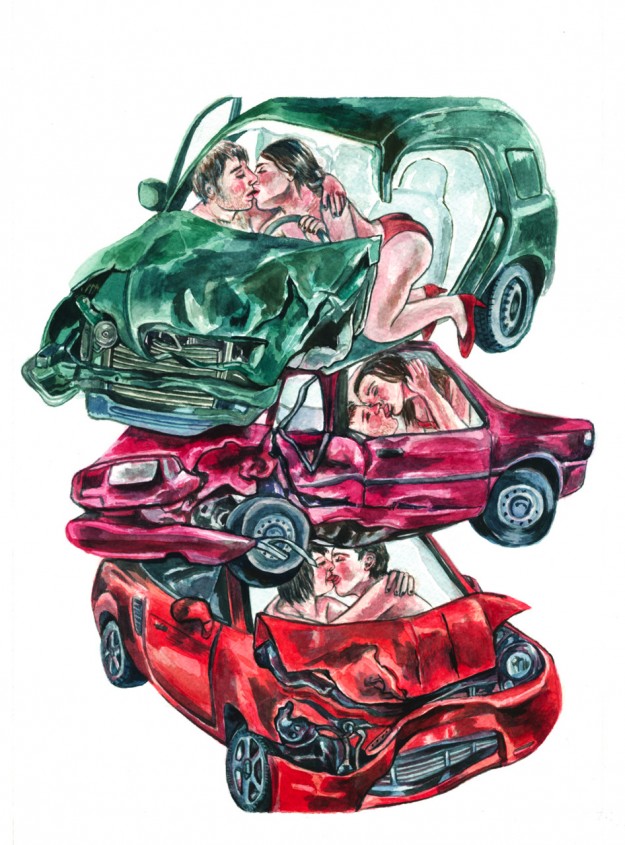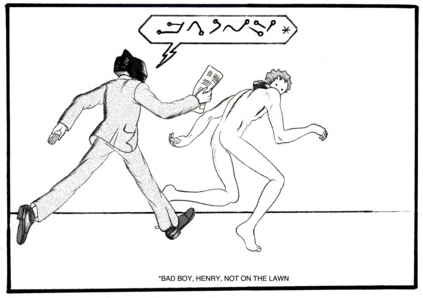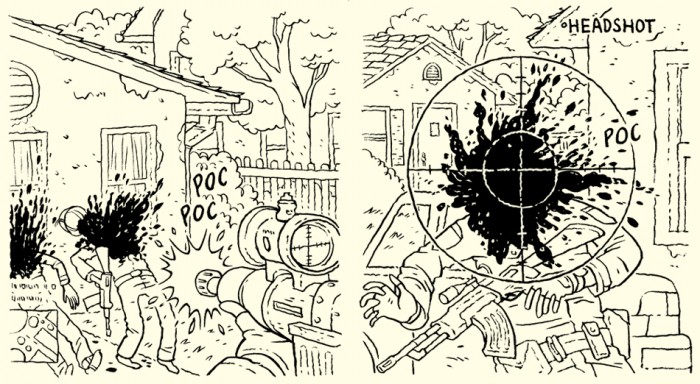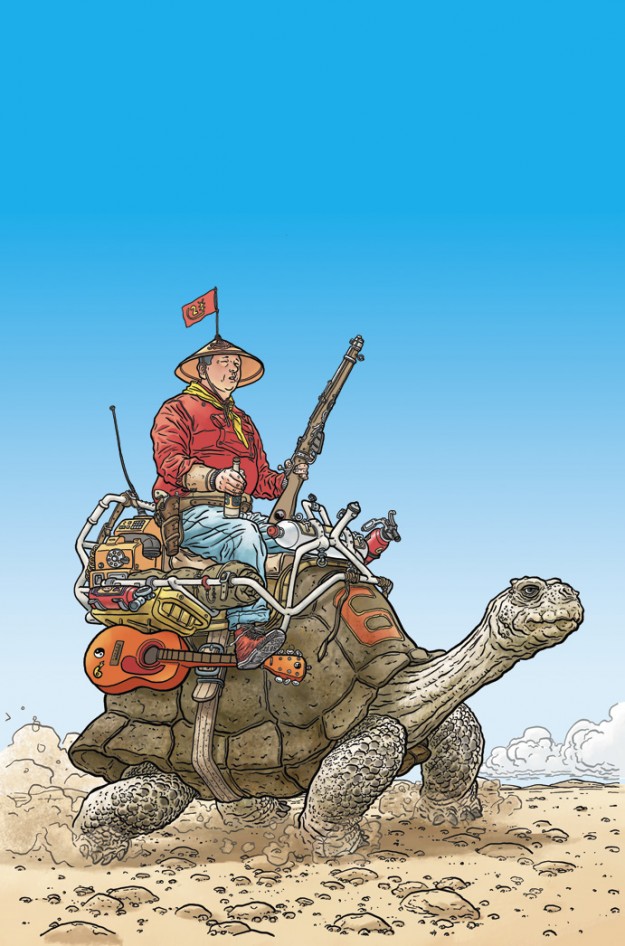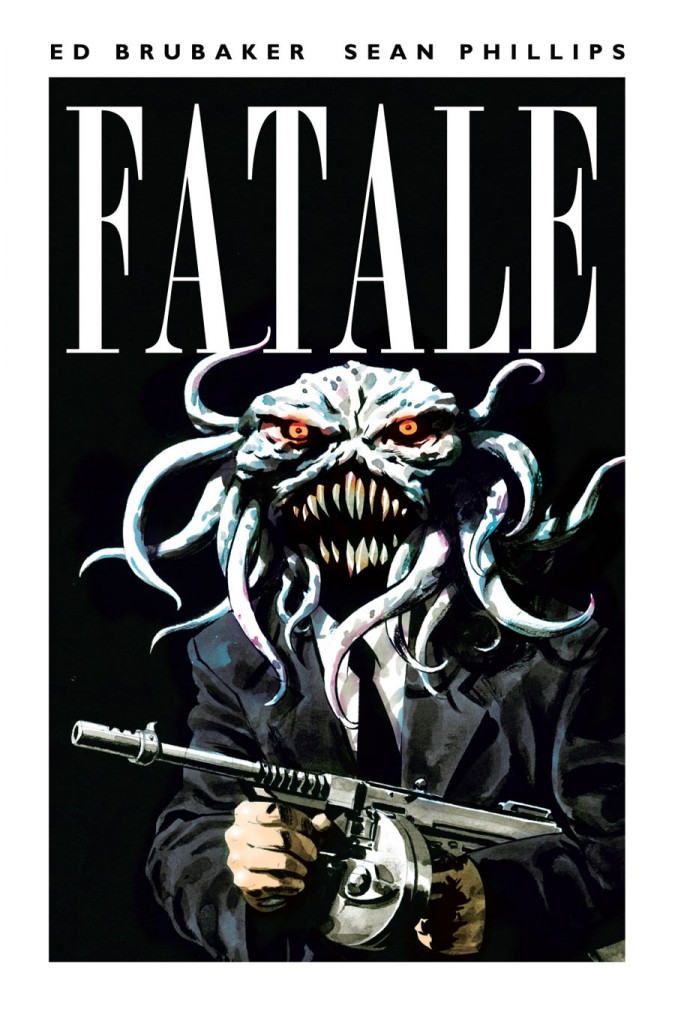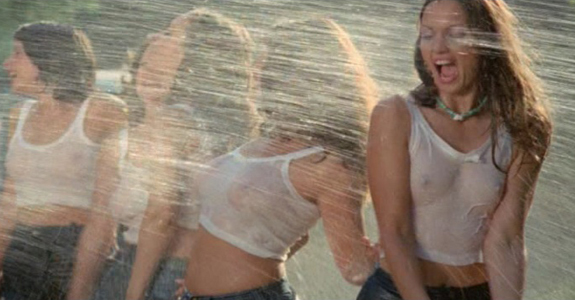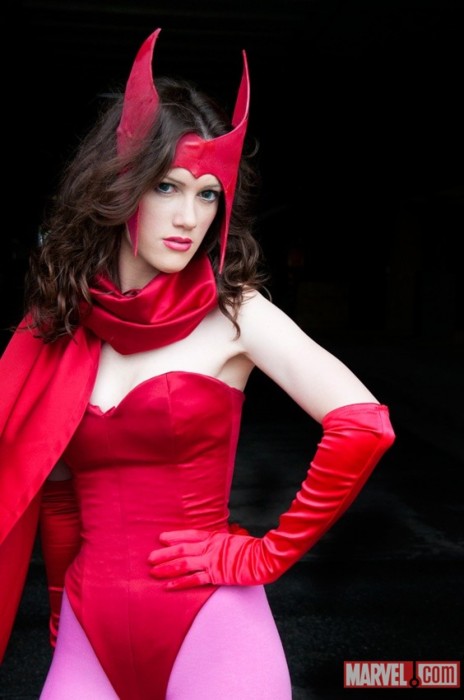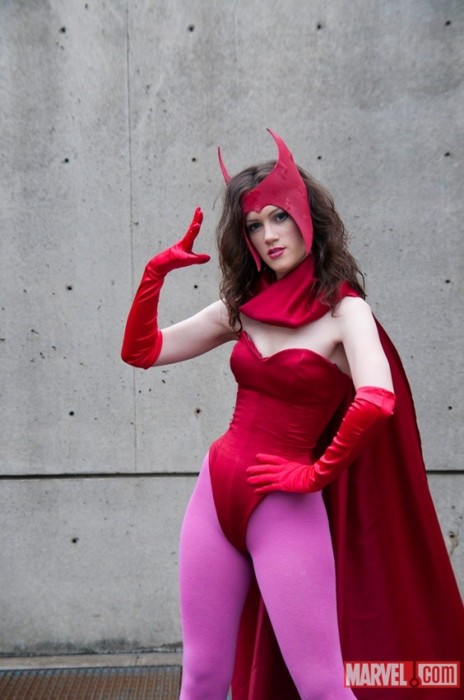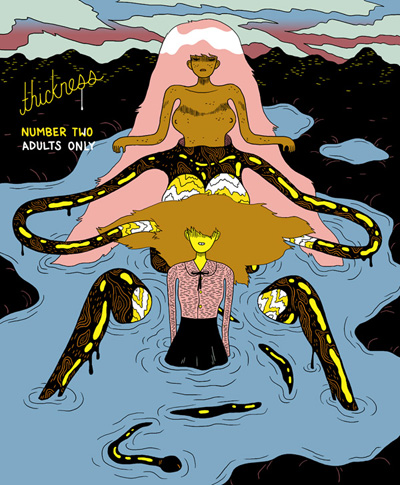Archive for October 31, 2011
“I am Lady Bones.”
October 31, 2011The final two pages of “Destructor and the Lady” have been posted.
You can now read the entire story on one page by clicking here.
Also, Destructor artist Matt Wiegle is getting married today, to Sally Madden. I think these pages are a good note on which to begin their life together. Congratulations, you two!
Carnival of souls: Habibi, Closed Caption Comics, Netflix, Ben Affleck, more
October 27, 2011* Your must-read of the day: The Comics Journal’s excellent Habibi roundtable, featuring Charles Hatfield, Hayley Campbell, Chris Mautner, Tom Hart, Katie Haegele, and Joe McCulloch. Savor it.
* Tom Spurgeon sounds off on people who approach acclaimed comics angry about their acclaim. Comics has a near-terminal case of “You think you’re better than me???”-itis sometimes. I’ve been there!
* I pulled out the superhero-related quotes because they were the pithiest, but Alex Dueben’s interview with Jessica Abel and Matt Madden about the Best American Comics series was a top-to-bottom fascinating look at their process, particularly the thinking behind the “Notables” section at the back of the book. Abel and Madden are two of contemporary comics’ most stealthily influential figures.
* Legendary will be publishing a new edition of Paul Pope’s The One-Trick Ripoff that will also serve as an omnibus of his non-THB work from the bulk of the ’90s, including his lost manga for Kodansha.
* Ganges #4 is out! This is a great comic book.
* Closed Caption Comics news: Did you know that Ryan Cecil Smith has a blog (via Shit Comix), or that Conor Stechschulte came out with a new comic called Fountain at BCGF last year? Because I sure didn’t! CCC folks: You realize I’m your target audience, right???
* Frank Quitely talks shop. I feel like that’s a rare occurrence?
* Chris Mautner didn’t think much of DC’s New 52.
* Rub the Blood is a noisy-alt tribute to the Image Comics of the early ’90s. Could be a pip, could be a pip. I mean, surely you want to see Victor Cayro take on Shadowhawk or whatever the case may be.
* Joe McCulloch on Yuichi Yokoyam’s Color Engineering. I’ll admit that Yokoyama’s painted style leaves me cold compared to his line art, but he also rarely disappoints, so I’ll certainly be reading this.
* Hooray hooray, Tom Kaczynski’s drawing pretty girls again.
* It’s always good to see new work from Tom Neely.
* Meanwhile I think we should take all available opportunities to look at the art of David B.
* Ben Affleck is maybe directing a feature film adaptation of Stephen King’s The Stand, and is definitely directing Matt Damon in a Whitey Bulger biopic written by Boardwalk Empire‘s Terrence Winter. And that is two more interesting Ben Affleck stories than I expected to read this week.
* I sure hope this means Kevin Huizenga will be drawing characters from every book in his unsorted pile.
* I’ve gotten an awful lot of enjoyment out of Nine Inch Nails’ cover of U2’s “Zoo Station.” It’s interesting to see how those two bands’ post-’90s activities have affected conventional wisdom about their (mutually excellent) ’90s activities.
* Speaking of: I’ve listened to the freshly reunited Orbital’s new song “Never” probably thirty times today. I haven’t been this delighted by the comeback of a band from my youth since I heard Portishead’s “Machine Gun.”
* So it was the side effects of the cocaine! (Hat tip: Matt Maxwell.)
* I remain completely amazed by how bad Netflix is at being Netflix. I really have never seen anything like it, this string of necessary changes handled as badly as possible coupled with unforced errors of spectacular proportion. Read the letter to shareholders excerpted at the end of the article at the link and marvel at the tone-deafness and inattention to detail (typos???).
* Real Life Horror: Heads on sticks. Greenwald is right: That line in Obama’s speech about killing Bin Laden that said it’s proof that America can do whatever we set our minds to weirded me out as deeply as anything in politics since the introduction of the previously unheard-of term “Homeland” as a descriptor of American territory. There was something very bad about each of these ideas, and I recognized the latter even in the depths of my unpleasantness.
* When it comes to the reason why you can never do a google image search for any of the Simpsons with the safe search filter turned off, you’re either part of the problem or part of the solution. Michael DeForge is now part of the problem.
Mad Men thoughts: Season Three extra/Season Four premiere
October 26, 2011I wanted to bring up a few things I forgot to mention in my Season Three wrap-up, and to talk about the first episode of Season Four. SPOILER WARNING
* Lane: When I first started writing about Season Three, I quickly noticed how many people seemed so excited by my mentions of Lane Pryce that it was like he was an old friend who came back to town. Though he seemed like a nice guy as a character, a decent man forced into a semi-indecent job and punished with abuse for his reliability, I wasn’t quite sure what the fuss was about. Until the Season Three finale. A “Well, gentlemen, I suppose you’re fired” here, a “Very good, Happy Christmas!” there, and suddenly his decency was complemented by that most delicious of traits: vengeance! The good guy won that one, and I’d imagine won many viewers hearts as well.
* I also suspect that the show modeled that behavior by welcoming Lane into the Bert/Roger/Don fold in that episode. If they can put his name on the wall, so can we, right?
* Sal: Well, I guess we’ve learned the limits of Don’s tolerance. With a simple “you people” directed at poor blameless Sal, he revealed that while he would in no way ruin a guy for behavior that didn’t impact on him, he’d cut the guy loose in a heartbeat the moment he did. Outing or ostracizing Sal would be an unforgivable breach of decorum for Don, but in his view, so too is Sal allowing (“allowing”) what he is to affect Don in any way. Don’s tolerant of anyone, to a point. After that, he’s pitiless.
* Sal’s departure from the show was one of the very few spoilers I’d stumbled across going into the series, couched in glimpsed headlines about Bryan Batt’s unhappiness with this, I believe. Seeing him in a cruising spot payphone telling his wife he loves her as our last glimpse of him was an appropriately heartbreaking goodbye for a character who was just a blast every time he was on screen. (Please don’t tell me if he comes back or not.)
* Speaking of departures, uhhhh, is Season Four the wholesale cast-change bloodbath it seems to be? Ken, Paul, Mr. Hooker, Kurt, Smitty, Allison, Lois the Lawnmower Woman, and all the other bit players at Sterling Cooper have been wished into the cornfield now? That’s harsh, man, and knowing what I know about AMC I have to wonder (and I mean have to wonder — I ain’t googling shit until the credits role on the Season Four finale) if costcutting was involved.
* My squeamishness about that aside, this was a fine start to things. The hilariously over-the-top swingin’ music cue when we first entered the new Sterling Cooper Draper Pryce office was just the first sign that this is a faster, looser, more informal operation; see also the fishbowl conference rooms and offices, the lack of a table, Peggy and the new artist’s non-stop in-joking, the presence of guys like Pete and Harry among the bigwigs, and on and on.
* Another break from the past: The show’s most explicit sex scene yet, with a dollop of sadomasochism on top. Based on everything we know about powerful men’s predilections, this fetish makes a lot of sense for Don, but it’s still a place I didn’t think the show would ever go.
* In this episode we had yet another case of the show teaching both us and the characters what’s wrong and how to fix it all at the same time. After a taciturn Don gives an interview to the Ad Age guy that’s quickly used against him, it’s easy to interpret his blow-up at the bathing-suit company reps who don’t want a sexy ad as typical Don Draper petulance. That’s clearly how Pete and Roger see it, it’s how Peggy would see it based on her earlier confrontations with Don over the ham-fight PR stunt, it’s how we’ve been primed to see it, and it may even be how Don sees it…at first. But when he turns around, goes back into the conference room he just stormed out of, and orders them to leave, there’s suddenly a method to the madness. If business is hurting because Don is too aloof, because the gap between his outsized success and his cipher of a personality is too huge, then by god he’s going to narrow it by becoming the swaggering champion everyone already expects him to be. And click! Like that, a series of character and narrative developments stretching back to his early, tense relationships with Pete and Peggy, his unease around Roger, his failure with Conrad Hilton, the formation of the new agency, and the Ad Age debacle all snap into place, leading to this moment: Draper Unbound.
* Now, I can’t imagine this ending well for anyone, of course…or at least I couldn’t if Don’s work situation ever ended badly for him. But so far it hasn’t. At the end of Season One, he unexpectedly triumphed over Pete by calling his bluff. At the end of Season Two, he unexpectedly triumphed over Duck by calling his bluff. At the end of Season Three, he unexpectedly triumphed over PPL by calling their bluff. Maybe Superdon will crash and burn, but if the show really gets serious about it, if it has him truly damage or ruin his career, I’d actually be quite surprised. That’s just not a place they’ve been interested in going so far. (Again, please, no hints, no “keep watching”s!)
* One last carryover from Season Three: Pete and Peggy are getting along great, apparently, answering my question about how the revelation of their child together would affect things. Seems like they’re both perfectly happy to act like it never happened. Which, you know, is really fine. I’m sure the kid is much better off with Peggy’s sister than he’d be in a shotgun-wedding family consisting of Mr. and Mrs. Pete and Peggy Campbell, or with a resentful Peggy on her own. They managed to be civilized about it.
Carnival of Sean
October 26, 2011* So as you might have heard, I wrote a Spider-Man comic and annotated A Game of Thrones.
* On the latter score, Elio Garcia of Westeros.org has posted his own announcement of the project. Elio calculates that he and I and Anne Groell wrote over 1,000 notes on the book between us, which both surprises me and doesn’t surprise me at all given how into it we all got. I’m telling you, it’s a really rich vein to tap. Elio also notes that Subtext is working on a web version, so you non-iPad users out there, take heart.
* And this was a daymaker: An effusive write-up from big-deal SFF site Tor.com, and one that quotes extensively from me at that. I mean, get a load of this praise:
“this definite guide is interactive, comprehensive, ever-expanding, and most of all, made with the fans in mind….The annotations aren’t idle theories, rather, these are insights from those who know this world better than anyone else in the world, save George R. R. Martin himself.
Who am I to argue?
* My chum Rob Bricken of Topless Robot notes how useful the annotations will be for those readers who can’t tell the players without a scorecard. He also touts our bonafides as experts, which apparently I will never get used to.
* And a special tip of the hat to the Chief, Dan Nadel, who very kindly congratulated me for the project on the blog of the estimable Comics Journal itself.
* As for Spidey, I’d like to thank three of my favorite comicsbloggers, JK Parkin, Tom Spurgeon, and Joe “Jog” McCulloch, for pointing their readers in my comic’s direction. Same for everyone on Twitter and Facebook who’s done so. Thank you all!
* And as noted, I spoke with my co-writer J.M. DeMatteis about all things Spider-Man for CBR.
* Meanwhile, I’m still making my way through Mad Men. Latest post on the end of Season Three here, archive of every MM post so far here.
* As I mentioned earlier, I reviewed Benjamin Marra’s Gangsta Rap Posse #2 for TCJ.com.
* Over at Robot 6, Eddie Campbell, Leela Corman, and I defend Craig Thompson’s Habibi against accusations of Orientalism.
Does whatever a spider can
October 26, 2011Comics Time: Gangsta Rap Posse #2
October 26, 2011Gangsta Rap Posse #2
Benjamin Marra, writer/artist
Traditional Comics, October 2011
24 pages
$3
Buy it from Traditional Comics
For today’s Comics Time review, please visit The Comics Journal.
Mad Men thoughts, post-Season Three edition
October 25, 2011Just finished Season Three. SPOILERS, SPOILERS, SPOILERS
* The Season Three finale was Mad Men‘s ultimate competence-fantasy moment, and kudos to T.J. Dietsch to tipping me off as to how and why: It’s a heist movie. Heist movies are always a competence fantasy, a narrative centered on pulling off a difficult job with efficiency and style, against authority, with a huge payoff. But in this episode, Mad Men goes even further. The usual beats are there: the “one last heist” set-up for guys like Bert and Roger; assembling the right team based on their specialties; watching the plan click into place as obstacles are overcome by equal parts hard work, moments inspiration (“Fire us”), and physical force; the efforts to conceal the planning, juxtaposed with the flamboyance of the successful execution’s aftermath. But the stuff that gets stolen by the men and women of Sterling Cooper Draper Pryce is incidental, of course. This heist’s target is talent. The best creative director, the best account men, the best copy writer, the best administrator, the best office manager. They use all their skills in order to be able to use all their skills. It’s a competence fantasy in which the item being stolen through their competence is their competence. It’s brilliant.
* But there’s another reason why it successfully hits my buttons. I’ve said before that my favorite thing to see depicted in fiction is competence, cooperation, and decency — in tandem. And that’s what this is. In order to pull this off, Don and Roger had to forgive one another and recognize one another’s indispensable talents. Don and Betty had to cease their incipient warfare. Don had to apologize to Peggy for mistreating her. Peggy had to come to terms with her gratitude to Don. Roger had to give Joan the respect she always wanted. Don and Roger had to assure Pete that he was valued as a worker and a person. Pete and Trudy had to come together on behalf of their shared future. (And based on the return of the Clearasil account, it sounds like they had to make amends with Trudy’s dad, too.) Bert had to acknowledge Harry’s vision and encourage him not to let it go to waste. Harry had to act like a man of vision in turn. Lane had to free himself from the abusive culture of PPL that had hamstrung him and his family for years. Don, Roger, and Bert had to acknowledge Lane’s talent, and his basic decency despite having been hired to be an overseer and hatchet man. Lane had to admit how much he admired the partners and enjoyed working with them despite their conflicts. In short, everyone had to be genuinely kind to and appreciative of everyone else. If you can think of a better feel-good moment in recent television memory than Don coming out of the bedroom in the new agency’s makeshift “office” to discover Bert, Roger, Lane, Peggy, Pete, Trudy, Joan, and Harry happily working, eating, and talking, I want you to program my DVR.
* But every rose has its thorn, and you don’t get much more direct than having Don dissolve his family in one room, then walk through the door to join his new work family in another room.
* If the first half of Season Three was Mad Men at its most Sopranos, the back half was Mad Men at its most Sirk. From Betty and Henry Francis’s fraught, unconsummated affair, to the newly suburban setting and “back to nature” purity (dancing around the maypole as Don’s fingers brush the grass; gathering outside to look at the eclipse) of Don and Suzanne Farrell’s affair, to lighting so lush and dramatic as to rise to the level of expressionism, Douglas Sirk’s melodramatic fingerprints were all over this. It gave these last half-dozen episodes a strong visual identity and cohesion.
* Indeed, this stretch contained a few episodes that are among the show’s tightest and most striking on an individual basis. Even in the moment — during the opening flashforward sequence in fact — I was floored by the structure and triple focus of the episode that starts with Don wounded, Peggy in bed with an unidentified man, and Betty glamorous and languid, then slowly reveals how they all got there.
** In Don’s case, I’m always a sucker for dramatically portentous strangers (cf. this past week’s episode of Boardwalk Empire), and thus loved the draft-dodging pot-smoking pill-popping couple he unwisely hooks up with.
** In Betty’s, I’m endlessly moved and fascinated by how her tightly wound way of life forces her to act out only in childlike, petulant ways, like buying a couch her decorator can’t stand.
** In Peggy’s, I’m still scratching my head over the erotic appeal of Duck Phillips, and wondering if he wasn’t simply a way to work out her issues with Don just as Pete warned her he was. Surely it was no coincidence that Don was forced by Bert to sign a contract in the same episode that featured the return of the guy over whom Don triumphed precisely because he didn’t have a contract.
*** Alas for Duck, Peggy’s sojourn as a Duckfucker appears to be coming to an end as she joins Sterling Cooper Draper Prce — you can sort of see it in her teary eyes when Don makes his last-ditch attempt to woo her in her apartment. I doubt Duck will take kindly to being duckolded like that.
** Plus, Bert showed the sharp teeth lurking beneath the Cheshire Cat grin by blackmailing Don with the unspoken specter of “Dick Whitman.” Surely this was the Emmy submission for something or other.
* Re: Suzanne—On a personal level, I must say that after the dyed distraction of Bobbi Barrett in Season Two, it’s nice to see Don picking up where he left off with Midge and Rachel in Season One and resuming his tour of the Great Brunettes of the Early ’60s. I got it bad, got it bad, got it bad, I’m hot for teacher.
* George Hearst in Deadwood, the Commodore in Boardwalk Empire, Conrad Hilton in Mad Men…Should I ever become a man of godlike wealth, influence, and power, please remind me that I need to go gray, lose my hair, and grow a mustache. Gotta watch out for those menacing mustache men! (Note to Weird Al: Please make “Pictures of Mustache Men” happen.)
* Actually it’s a bit tough to know what to think of Connie from where I’m sitting. Perhaps the best way to think of him is as a Grant Morrison-style doppelganger/double/reflection of the hero. As his presumption to father-son dynamics would indicate, Connie is Don writ large. From similar diminished circumstances, he rose even higher than Don. From similar personal alienation, he has developed an even more impressive bulldozing business style, coupled with an even more charming personal style. And in a similar guise of being a straight shooter, he’s able to be even more capricious, self-indulgent, and cruel than Don at his moodiest and most mercurial. When Hilton calls Don on the carpet for not putting together an add campaign for the Hilton chain’s entirely imaginary hotel on the moon, that’s the moment when the by-golly gives way to something approaching terror that this madman has the kind of power he has. There but for the grace of God.
* However, we did learn in the finale that Hilton served one other purpose: teaching Don that he needs Roger. Gladhandler and heel though he might be, sometimes gladhandlers and heels are required! But more than that, presumably Roger would have seen Hilton’s capriciousness coming and put the brakes on. That’s required too.
* What I like best about that particular revelation, though, was that it was revealed to us at the same time Don articulated it to both himself and to Roger. The wheels click into place, and suddenly, “A-ha! So that’s what the writers were up to!” exists in a spot where there used to be only uncertainty.
* The show did it again several minutes later, when Don makes his pitch to Pete: He needs Pete not for his portfolio or his skills as an account man, but because he is, of all things, a forward thinker. Teenagers, aeronautics, “the Negro market” — beneath his bluster and petulance, Pete has basically seen the entire ’60s coming. But I never saw that he saw it, and I don’t think most of the people at Sterling Cooper saw it, and I’m not sure Pete himself saw it either, not until Don articulates it this way at this moment. It was another “A-ha!” Really, really smart writing.
* So how did we feel about Betty’s discovery of Don’s secret past and their marriage’s subsequent dissolution? I wonder if I’m focusing so much on the work stuff because, as was the case with the earlier episodes in the season, Don’s romantic and family life felt less essential to the story this season. Ironically, perhaps, given that he and Betty had a baby and then broke up, but there you have it. It also proceeded in pretty much the way I expected, lacking only a really thoroughgoing breakdown on Betty’s part upon the initial discovery: finding a key, finding the box, debating whether or not to tell, confronting Don, Don’s emotional collapse, an attempt to be honest and bridge the gap, a subsequent rejection, angry words leading to the unspoken threat of violence, the split, a slight rapprochement. Other than the gasp exhaled at the moment Betty opens the drawer, none of this came as a surprise.
* But it was impeccably executed, mind you. Jon Hamm’s an extraordinary physical actor, and made it so that watching him fumble and drop his cigarettes was somehow as bad as him pissing his pants. Later, his drunken, rageful confrontation with Betty over Henry Francis was a concise blast of all his money, class, sex, mother, and father issues right in her face. When he tells her she’s a whore, it’s an indictment of anyone and everyone he thinks just laid around collecting other people’s money rather than going out and making it themselves — Betty, Roger, Henry Francis, his dead mother.
* January Jones…you know, okay, I see what people’s problem with her is. She’s stiff. But whether or not that’s by choice, isn’t it perfect for Betty Draper? Even a Betty Draper in extremis? Whether we can thank the casting director or Jones herself, playing that role that way makes Betty a character unto herself rather than a type.
* I worry about Sally Draper. The loss of her grandfather, the assassination of JFK and his alleged killer, and her parents’ divorce, all at once. Authority’s crumbling all around her, and the instruction she does receive from it — Gene slagging her mom, her mom’s pretty messed up ideas about romance — aren’t going to help. Again, Kiernan Shipka’s a fine young actress, so I hope they go somewhere with all this.
* JFK. That was handled about as well as I can imagine anything handling it. The initial broadcasts, the cacophony of ringing telephones suddenly silenced, the huddled groups of whispering and crying people, the days spent staring in disbelief at the television, the narcissistic but totally understandable resentment of how one’s own plans have suddenly been upended…it was horrifying, heartbreaking, scary, and all too familiar.
* Two lines from that episode stand out: Don’s genuinely stunned and baffled “What?” when Betty tells him that Oswald has been shot, and a confused Bobby naively asking Don whether they’d be going to the President’s funeral. I teared up at that last one, because I know the truth about Don’s reassurance that everything’s going to be okay. It never was. It never is.
Spider-Men
October 25, 2011Over at Comic Book Resources, I talked with J.M. DeMatteis about writing Spider-Man in anticipation of our (!!!) comic Marvel Adventures Spider-Man #19 — in stores tomorrow!
The Annotated A Game of Thrones
October 25, 2011I’m over the moon to be able to finally announce this: I annotated A Game of Thrones.
I didn’t do it alone, either. Working alongside me were Anne Groell, editor of the entire A Song of Ice and Fire series; and Elio Garcia, George R.R. Martin’s go-to researcher, the co-founder (with Linda Antonsson) of ASoIaF megasite Westeros.org, and the co-author (with GRRM and Antonsson) of the forthcoming World of Ice and Fire guide.
I know, right?
We did this in a very cool fashion for a very cool new iPad app called Subtext, which launches today. It’s kind of like having a social network built into the book itself.
The way it works is that you download Subtext for free from the iPad App Store. Then you use it to read any Google Books ebook. As you do so, you can embed notes in the margins at any point throughout the book, sharing your thoughts or asking questions about what you’ve read. You can also read and reply to any notes on the book left by your friends, or in cases like A Game of Thrones, notes left by the author or by experts like, well, me. This video will give you the basic idea.
So in other words, it’s not just that you can read an annotated version of A Game of Thrones — you can annotate it yourself, and interact with anyone else who’s done so, including Anne, Elio, and myself. And a whole bunch of other books featured in the launch have expert or author annotations as well. (George was a bit too busy to contribute himself, which is why we three were tapped. Somehow I don’t think you’ll mind that he didn’t find time in the schedule.)
If you’ve enjoyed my writing about A Song of Ice and Fire here or at All Leather Must Be Boiled or anywhere else, I think you’ll enjoy the notes I’ve left for you to find.
But speaking personally, my contributions kinda pale in insignificance compared to Elio and Anne’s. When I was first approached about the project, I said yes in large part just for the opportunity to work alongside such august personages in the ASoIaF community. I was not disappointed. Anne’s you-are-there anecdotes about discovering the book, working with Martin, and what she knows (and doesn’t know) about what has yet to be written are worth the price of admission alone. (And I’ll tell you what, there’s little that does your superfan ego better than being told by the book’s editor that this or that insight you had about the book was dead on.)
Elio’s astonishingly comprehensive annotations are also more than a return on your investment. He’s provided the first appearance of nearly every character, House, region, and in-world jargon with a capsule biography/definition and a link to further information on his and Linda’s indispensable ASoIaF website, Westeros.org. And as GRRM’s researcher and soon-to-be coauthor, the guy who knows Westeros better than Martin himself, he too offers unique insights into process, theme, and technique.
In both cases, just reading their notes as they went up while I was working on the project was an enormous pleasure. God only knows how much of that AT&T data plan I ate up by anxiously refreshing the Recent Notes page to see if Anne or Elio had dropped any more knowledge bombs on me. And my desire to earn my keep alongside them led, I think, to some of my best ever writing on the book.
I really hope you iPad owners will check it out. Download the app here, then download the book here, then go to town. Our annotations should pop up automatically — keep your eye out for my sigil.
See you in the pages!
PS: Thank you to Elio Garcia for recommending me for the project, thank you to Elio and Anne Groell alike for treating some dude with tumblr like both a peer and a pro, and thank you to Claire Teter from Subtext for guidance and support throughout the process.
Brief Boardwalk Empire thoughts
October 23, 2011SPOILERS AHEAD
I’m really admiring Boardwalk Empire‘s narrative audacity this season, from a structural perspective. Last season’s cliffhanger was that Jimmy, Eli, and the Commodore were conspiring to take Nucky down. My assumption, and everyone else’s I assume, was that we’d spend much of Season Two watching this happen. It’d be a slow race toward the final coup attempt: the conspirators working to keep their plans secret before the trap is sprung, Nucky working to stay on top and get to the bottom of the setbacks that would surely start to befall him.
Instead, the coup happened in the season premiere. It turns out Nucky’s too big to take down in one fell swoop, but that aside, he learned that his brother, mentor, and protege had all betrayed him; that the city bigwigs were backing his enemies; that he was all alone, with his money and clout in serious danger. Instead of whether the coup would take place, the season is about what happens afterward. Smart stuff.
So too is the arrangement of the warring parties. In a battle between Nucky and Jimmy, there’s no default for the audience’s sympathies. Nucky’s the guy in the credit sequence, but the story we were really sold from the beginning is the story we’ve seen many times before — the hungry young man on the make. In other words, there are two protagonists, and after watching them work together for a full season (albeit with some hiccups), we’re now watching them become one another’s antagonist. Who do you root for? What’s more, their primary allies on the criminal end of things are the show’s two most compelling such characters, Chalky and Richard. We’re obviously to root against the conniving, child-raping Commodore, and the politicians on both sides aren’t worth spit, but there really is no easy way to take sides between the primary players. Obviously there are plenty of big prestige cable dramas who at least attempted to split audience sympathy between rival factions, but for the most part there were still clear good guy/bad guy lines established initially, regardless of where things went from there — sheriff versus crime boss, cops versus druglords, stern but kind Northerners versus arrogant, hedonistic Southerners. Boardwalk Empire has really split things down the middle, and I’ve got no idea what side I’m gonna come down on. Mostly I hope for a rapprochement. Don’t you?
Carnival of souls: Marvelcution ’11, more Sexbuzz, Jonny Negron does Drive, more
October 21, 2011* Alejandro Arbona and Jody LeHeup, two of Marvel’s best editors and the men responsible for Invincible Iron Man & Immortal Weapons and Uncanny X-Force & Strange Tales respectively, were laid off by Marvel yesterday, among many other employees of long standing. I’ve been pretty upset about this. Comic Book Resources provides the facts; Tom Spurgeon and Heidi MacDonald provide much-needed and highly infuriating context.
* “Dylan [Williams] said something once that really stuck with me. ‘Art isn’t bullshit and love isn’t bullshit.’”—Austin English
* Wow, speak of the devil: Andrew White has posted the complete Chapter Five of Sexbuzz.
* Vasilis Lolos is prepping a webcomic called Supersword, the goal of which, he says, is “Lord of the Rings for the Nintendo generation.” Sure, I’ll eat it.

* Well, it happened: Jonny Negron saw Drive. AND THE REST IS HISTORY.
* Tom Gauld’s doing a book for Drawn & Quarterly? Tom Gauld’s doing a book for Drawn & Quarterly!
* Dustin Harbin drew some dinosaurs, Sam Bosma and Kali Ciesemier colored them, and it was good.
* Whoa: Matt Zoller Seitz says the new Kelsey Grammer drama Boss is a great show.
* The great cartoonist Jason lists his five favorite giallo actresses and posts a picture of Edwige Fenech for emphasis. Paging Dr. Purcell, Dr. Curt Purcell!
* Happy birthday to Mike Baehr of Fantagraphics. Like so many Fanta employees, he’s one of the good ones.
* Real Life Horror: I guess we’re sending flying killer robots to execute American teenagers from the sky at will now, which is super-fucking-exciting, isn’t it.
* Wow, Uno Moralez has really outdone himself with this image gallery. It’s called “Horny Goblyns,” and it makes the abbreviation NSFW a comical understatement.
* Sex, synths, teen angst/lust, eldritch horrors: Is there anything about Jérémie Périn’s video for “Fantasy” by DyE that isn’t one of my favorite things? (Hat tip: Steven Wintle.)
You’ve come a long way, Jaime: or how I learned to stop worrying and love Love and Rockets
October 21, 2011I wrote about “getting into” Love and Rockets for Robot 6. It’s the culmination of a week’s worth of posts on the subject. Take a look.
Comics Time: Ganges #4
October 21, 2011Ganges #4
Kevin Huizenga, writer/artist
Fantagraphics/Coconino Press, October 2011
32 pages
$7.95
Buy it from Fantagraphics
For today’s Comics Time review, please visit The Comics Journal.
He’s your worst nightmare
October 20, 2011Comics Time: Jaime Hernandez, Jeet Heer, Michael DeForge, Uno Moralez, more
October 19, 2011* I posted a rundown of all the things I’ve been working on lately over on my A Song of Ice and Fire/Game of Thrones blog All Leather Must Be Boiled. Keeping pretty busy!
* BAD COMICS ARE THE DISEASE. JAIME HERNANDEZ IS THE CURE. I’m going full-court-press on Jaime and Love and Rockets: New Stories #4 this week, in case you hadn’t noticed. The latest:
** Springboarding off Tom Spurgeon’s excellent piece, I talk about Jaime as a literal alternative comic for disgruntled or jaded readers.
** And springboarding off Jeet Heer’s excellent catch-all column for The Comics Journal, I talk about “The Love Bunglers” as a potential career capstone, and Gilbert’s comics as an under-the-radar phenomenon of comparable quality and import vis a vis his thirty-year storyline.
* There’s lots more to talk about in Heer’s post, by the way. I’m particularly struck by his argument that the work of contemporary cartoonists on classic reprints in a design, editorial, or critical capacity helps fold those works into the current practice of comics the same way a Scorsese riff on Welles or Eisenstein does in film. It comes as a riposte to some bombthrowing on the topic of contemporary vs. classic cartoonists, too, and you know I always like to see bombthrowing defused.
* Also on the L&R tip: Matt Seneca on the bravura mirrored sequence in “The Love Bunglers.” No, not that bravura mirrored sequence — the other bravura mirrored sequence.
* Yeah, I’m pretty happy about Sexbuzz.
* Ben Katchor’s latest comic takes on the 1%.
* Like the Geto Boys, Michael DeForge can’t be stopped. He’s posted a new installment of Ant Comic, while his wondrous horror minicomic SM is now up in its entirety on Jordan Crane’s What Things Do. Jesus but his line really pops against that cream background.
* The good news: Ross Campbell has finished Wet Moon 6, the latest volume in his engagingly morose and meandering goth slice-of-lifer. The bad news: It’s not coming out until October 2012.
* A day may come when I don’t link to a new Uno Moralez image/gif gallery…but it is not this day.
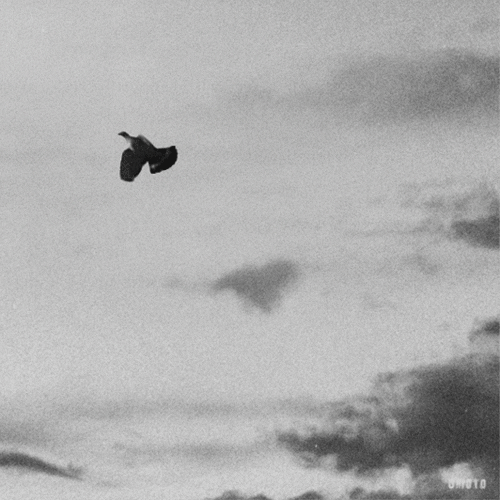
* Speaking of Moralez, I don’t know if Google Translate is steering me right, and the post itself is showing up in my RSS reader but can’t be accessed directly, but a post that features the image below and appears to state that Moralez is self-publishing a collection of his work is too good not to at least try to share.
* I love Matthew Perpetua precisely for posts like this one. In one fell swoop he singles out the best song on the new album by retro synthgazer guy M83 and quickly describes why it’s good, while also explaining why his overall project never quite gets off the ground:
Their new album, a double disc set, is sprawling and “epic,” but its expanse is mostly numbing – a few setpiece numbers are surrounded by ethereal time-wasters and underwritten bombast.
That is exactly right, and it’s been exactly right for at least three albums running now. In theory M83 could not be more up my alley, and from single to single he’s one of my most listened-to artists of the past decade (up until now, that is — I’m not crazy about “Midnight City”; too much yelping), but in practice his albums feel overlong, undercooked, and too content with his (admittedly) great idea for a musical aesthetic to actually execute that idea well. But yeah, “Claudia Lewis” is pretty terrific.
* If you know the source of the image, this is one of the funniest Kanye + Comics entries ever.
A friendly reminder from Kraven the Hunter
October 19, 2011One week from today, I make my Marvel Comics debut with “The Amazing Spider-Man in…The Hundred-Story Hunt,” the back-up feature in Marvel Adventures Spider-Man #19. Illustrated by Pere Pérez, it’s a battle between Spidey and Kraven in a high-rise office building. Hey, write what you know!
It’s not Kate Beaton’s take on ol’ Sergei Kravinoff, but it’ll do. I hope you buy it and enjoy it.
Mad Men thoughts: Special “…and the John Deere you rode in on” edition
October 19, 2011* Just finished Season Three, Disc Two. SPOILERS AHEAD.
* I’ll admit it: I’m looking forward to being able to type “Mad Men” into Google and go berserk the moment I finish the series so far almost as much as I’m looking forward to the act of finishing the series itself. For years now I’ve been very studious in avoiding talk about the series (I lead a life lived in terror of spoilers, basically.) But even so, some things slip through the cracks — and sad to say, Roger Sterling in blackface was one of those things. Because I’m usually so careful I have no idea how I came across the image, but sure enough, a couple of weeks ago a Google image search revealed Roger doing his best Al Jolson. I winced for many reasons, but “Aw, shit — that would have come as a complete shock otherwise” was not least among them.
* Fortunately (if that’s the right word), enough time had passed that I sort of forgot the moment was coming, and when it did come it was more than shocking enough on its own terms. Literally jaw-droppingly shocking in fact. I sat there on the train staring at my laptop catching flies as dapper, jolly, funny, skeevy, charming Roger Sterling serenaded his bonnie bride with centuries of unthinking racial animus and privilege smeared all over his face. I think my main thought was “blarrrrrrgggghhh.”
* I think that was Don’s main thought, too. The big question, I suppose, was what made Don more uncomfortable: Roger’s heedless racism, or his heedless foolishness? It’s the foolishness that Don smacks Roger around for at the end of the episode, but his conversation with the incognito Conrad Hilton at the club’s abandoned bar indicates a lingering sense of solidarity with the help, no matter who they are. As was perhaps the case when he ignored Sal’s hotel-room indiscretion, I get the sense that the only thing that makes Don judge a person is incompetence. Insofar as bigotry blinds one to the feelings of a class of other people who could otherwise be engaged and thereby communicated to as an audience, bigotry is a form of incompetence, and that’s what matters.
* I did permit myself a bit of googling after the episode was over, and a quick search for “Roger Sterling blackface” revealed some pretty shallow and facile thinking about Mad Men‘s approach to race prior to the episode. I’m both amazed and not at all surprised that people who get paid to write about these things mistook the way the show reduced African Americans to speak-only-when-spoken-to servants, or to saintly nannies turned to in times of crisis, or to evidence of one’s beatnik bonafides, as evidence of the show’s racism rather than as an indictment of the characters’. Apparently episodes in which the characters gathered ’round the TV and talked about Birmingham would have been “better” than showing how they’d created a world for themselves where black people were permitted to exist at the margins but no further. I dunno, man. If that’s not an intentional absence, I don’t know what is. And watching it slowly leak into their lives as a presence — Betty’s drug-induced vision of the sad, slain Medgar Evars; Pete Campbell’s incredulity that anything as irrational as not wanting to be seen as the Negro TV company could ever trump the making of money; Paul’s failure to maintain a romantic relationship that needs must exist as more than symbolism and platitudes — has been bracing.
* Elisabeth Moss is a terrific actress because the role she’s playing is so challenging for a person of this day and age to play. She has to play Peggy as a strange and alien creature called a “woman,” learning and fighting to become a “human,” a transformation basically without social precedent.
I’ve been thinking a lot about sexism lately — I’m watching Mad Men, reading about superhero comics, and raising a baby daughter, so how could I not? And I’ve realized that I believe women are different from me as a man in three very specific ways and those three very specific ways only:
1) They have slightly different biology.
2) They identify as “women.”
3) I find some of them sexually attractive.
As best I can tell, that’s it. Aside from those three things I’ve never encountered a difference between myself and a woman that couldn’t be explained as a facet of that particular woman as an individual person rather than as a facet of her woman-ness. I remember discovering my senior year in college that one of my roommates had deliberately never taken a course taught by a woman professor unless required to, and this totally blew my mind — it quite literally never occurred to me that women as a class would be less good than men as a class at anything other than, like, bench pressing. I’m not saying this to pat myself on the back because I in now way feel like I deserve any “credit” for this viewpoint, any more than I deserve credit for having blue eyes. I did no work to get here. It’s just the way I see things, even if I’m only now articulating it in precisely this way, and mentally I never had the option of seeing it some other way, I don’t think.
The point is that problems arise when men think of women as a separate species. When Peggy looks at Don and sees who she wants to be, not who she wants to be with, for most men in the office that’s akin to a chimpanzee putting on pants.
* One variable I’d forgotten when trying to pinpoint the origin of Pete and Trudy Campbell’s newfound team spirit was Pete’s discovery that he’d fathered a child with Peggy. I’ve done a shit job of keeping track of Pete and Peggy’s relationship in light of this revelation this season — I barely recall if they’ve been palling around like the rest of the officemates or just cordial or barely speaking to one another — but all the evidence you need for the Campbells’ current relationship can be found in their hotstepping at Roger’s party. It made me happy for both of them to see them be stars together, however briefly.
* The bit at Roger’s party where that dude asks to put his hand on Betty’s stomach? Yeesh, this really is a sexy show. The performance of desire and arousal, and the invitation to intimacy. That’s where it’s at.
* I think my idiosyncratic Mad Men crush is on Sal’s poor wife Kitty. Meow!
* On a more serious note, what do you think she knows? Even though Sal would set off a five-alarm gaydar alert for most of us today, his coworkers seem completely oblivious, so it’s reasonable to assume Kitty is or was, too. I mean, she married the guy, and apparently after nurturing a boy-next-door crush on him for years beforehand. But she obviously senses that something is off. She feels left out when Ken comes for dinner, and she tells Sal he’s been distracted or distant for months. I really find myself puzzling out her teary eyes when Sal performs the Ann-Margaret routine he’s directing in the diet soda commercial for her. At first it seems she’s emotional because he’s letting her into his world. Then it seems like she’s upset because he seems so much more passionate about this Patio ad than he is about her. Then perhaps she’s jealous of the attention this presumably young and beautiful actress is receiving from him. But…is there also a sense that in this flirty, theatrical playacting, he’s somehow more himself than he’s ever been?
* I love moments when Matthew Weiner’s Sopranos starts showing. Previously the standout was the bit with the neighbor’s pigeons, the Drapers’ dog, and Betty’s gun — the lyrical way in which that stuff was shot, the use of animals, the weird outburst of violence. This season I think there’s been more than usual. We’ve had the episode that focused on a character who was about to die as he made some portentous final memories with another character (Gene and Sally). Betty had her dream sequence during childbirth. The agency preying on the dipshit jai-alai trust-fund kid was the Scautino bustout all over again.
* And, of course, the lawnmower. That was a majestic moment, man. Hilarious and awful and unforgettable, like any number of great Sopranos moments. I know without looking that there are a million animated gifs out there of that, aren’t there? Since violence on the show is so rare, a flash of grand guignol like that probably had a similar effect on large segments of the audience to the one it had on the people there in the office. (Wait, there was a Peggy/Pete moment I remember — he caught her when she fell. Dun dun dunnnnn!) It also gave rise to some of the show’s funniest and most mordant black humor: The “He might lose the foot.” “Just when he’d gotten it in the door!” exchange was topped only by St.-John-whatsisnames grave pronouncement that “The doctors say he’ll never golf again.”
* What’s more, it gave us sympathy for Lane, for perhaps the first time. He’s seemed like a decent guy rather than a tyrant throughout, but it wasn’t until he was rewarded for his achievements at Sterling Cooper by being packed off to Bombay effective immediately, a fate he resigned himself to in the space of about 90 awkward seconds, that we realized how much his stiff upper lip, company-man persona could cost him. The owners can rely on him and thus abuse him, and making himself amenable to the abuse is the only way he can make himself indispensable. When he tells Don that he feels like Tom Sawyer at his own funeral and didn’t like the eulogy, I really felt how awful that must be: to be great at your job and respected less because of it, not more. He’s the anti-Don.
* Writing that very last sentence made me realize that I’m barely talking about Don himself! He’s receded a bit this season — perhaps because he’s not sleeping around and thus there’s less relationship drama for him to star in, while at home he takes a back seat to Betty and the baby, plus after he threw his weight around in the final confrontation with Duck over the sale, we know he’s probably got more job security than anyone else at the company?
* Still, I think we got a “shape of things to come” moment when he talks to Sally’s hot, slightly drunk teacher over the phone as she divulges her personal history, then still thinks to tell Betty that it was “no one” even as they leave for the hospital for her to give birth to their baby. The ease with which he lies is alarming.
* But so too can be the ease with which he tells the truth. I have two married siblings, as does my wife, so I’ve seen just about every possible relationship between a person and their parents-in-law, from “great” to “my God make it stop.” Even so, I was still stunned when Don told Betty “He hated me and I hated him — that’s the memory.” To put it so bluntly, to remove any wiggle room for politeness and decorum…even after Gene’s death, that’s still a huge shock to the system. Good for Sally for coming in at just the right moment and defusing the situation by apologizing for bothering the baby.
* And man, Sally’s an MVP, isn’t she? That kid’s a terrific actor, and the show really uses her without overusing her. (Lately I’ve thought about the problems faced by Game of Thrones in having so much of the story driven by children acting basically on their own. The show had to age all of its characters up for a variety of both content-based and logistical reasons, but one of them was that if they’d kept (say) Arya and Bran at their ages in the book, you’d basically be relying on children the age of Sally and Bobby Draper circa Mad Men Season Two to anchor a quarter of the show.)
* Back to the lawnmower incident: Here we had another tour de force writing performance. An entire episode is spent setting up the possibility of a new status quo, ramming it into place, and forcing both us and the characters to contemplate it…then completely undoing it with one drunken mishap. I love not being able to expect where things are going even when the show comes out and says “This is where things are going.”
* Name nerdery: One of my favorite little comics factoids involves the naming conventions at the two big superhero publishers. DC characters tend to have a first name for their last name: Clark Kent, Bruce Wayne, Hal Jordan, Barry Allen, Guy Gardner, Tim Drake, Jason Todd, Ronnie Raymond, Barry Allen. Marvel characters have alliterative names: Peter Parker, Reed Richards, Sue Storm, Stephen Strange, Matt Murdock, Bruce Banner, Scott Summers, Warren Worthington, Victor Von Doom. (Also fun: finding the exceptions. Marvel’s got Donald Blake, Bobby Drake, and Clint Barton; DC has Wally West, Guy Gardner (again) and Superman’s entire supporting cast.) I’ve noticed something similar about Mad Men. The male characters’ names are nearly always a one-syllable first name and a two-syllable surname with the emphasis on the first syllable, i.e. “First LASTname” — Don Draper, Dick Whitman, Pete Campbell, Ken Cosgrove, Bert Cooper, Paul Kinsey, Duck Phillips, Gene Hofstadt, Bill Hofstadt, The female characters’ names are nearly always a two-syllable first name and a two-syllable surname, with secondary emphasis on the first syllable of the first name and primary emphasis on the first syllable of the surname, i.e. “Firstname LASTname” — Betty Draper, Peggy Olsen, Trudy Campbell, Rachel Mencken, Mona Sterling, Sally Draper, Bobbi Barrett, Judy Hofstadt. As the alpha male and female, Roger Sterling and Joan Holloway/Harris are the exceptions that prove the rule.
Comics Time: Sexbuzz
October 18, 2011Sexbuzz
Andrew White, writer/artist
Self-published online, 2010-
Currently ongoing
Read it here
Holy shit. Who is this guy?
Though I first encountered Andrew White’s work through a collaboration with the writer Brian John Mitchell on one of Mitchell’s very tiny minicomics, I didn’t really become aware of White as a creator until a few weeks ago, when (I believe via twitter) I followed a link to his homepage and read this science-fiction sex/spy/slice-of-life webcomic. To say I was impressed would be an absurd understatement. Let me put it this way: I emailed my friends freaking out about him, but refused to tell him his name, because I didn’t want the word going out. A quick google search, in fact, had revealed essentially zero hits. The only person talking about Andrew White was Andrew White, and barely at that. That is nuts.
In Sexbuzz, you’ll see a lot of what you like in the comics of Dash Shaw in the way White fuses science-fictional ideas with formal play rather than with set dressing, which in turn gives him the freedom to pursue human-interest storylines without getting tripped up by excessive visual worldbuilding. You’ll see some Ryan Cecil Smith in how he uses loose, almost ramshackle character designs and a fine sense of movement and momentum in his action sequences to make his world feel loose, large, and full of possibility. You’ll see Paul Pope in his big thick ink squiggles, and a fixation on the role of physical objects as a loci of near-future science fiction rather than a more ethereal digital conception of the genre. You’ll even see some Gilbert Hernandez in the way he occasionally pulls back for isolated, abstracted images of the world around us that suffuses it with a weird melancholy magic.
But beyond all the trainspotting, White’s just very good at making the most of the tools at his disposal. The comic’s long vertical scroll gives you the sense of a long story, a story to get lost in, unfurling before your eyes. His graytones are beautifully applied for shading and contour, but also enhance the impression that this is a dingy, rain-soaked city of the night. He’ll slow time down to a crawl with spread-apart panels that evoke McCloud’s infinite canvas without using it outright, then leap forward in time at a chapter break. And he’s constructed the story itself — about underemployed twentysomethings who steal the works for their dangerous technological sex drug Sexbuzz from a sinister corporation — with ample room to play in any number of genres: sci-fi spy thriller, a satire of the corporate/security state, alt/lit young-person relationship drama, action, romance, even erotica. (The nakedly transactional exhibitionism of that opening chapter is hot stuff.) Like Jesse Moynihan’s Forming before it, it’s the kind of webcomic you dream of stumbling across. Long may it run.
(Here are a few pages.)
Carnival of souls: Special “post-NYCC” edition
October 17, 2011* Recently on Robot 6: Everybody’s talking about “The Love Bunglers,” and everybody should be talking about Jim Woodring too.
* Dustin Harbin salutes Dylan Williams.
* Lisa Hanawalt draws J.G. Ballard and opens a spiffy new store.
* New comics from Jonny Negron! Not, perhaps, what you’d expect.
* Jordan Crane’s Keeping Two has taken a turn.
* Grant Morrison’s long-discussed plans for a Wonder Woman series seem to be taking shape for sometime next year. Sounds kinky. I wonder if anyone will mutilate a horse, walk around a room naked, or dismember a guy in this one.
* David B. is working on a book on the history of U.S./Middle East relations?
* DC’s relaunch moved a lot of units. Correct me if I’m wrong, but I think this is the first time a Big Two publisher has ever brought forth its own set of actual sales figures since I’ve been following these things.
* Geof Darrow’s Shaolin Cowboy never seemed to find its way into Wizard’s hallowed halls when I worked there during its run, so I have yet to read any of it. I can’t tell if the NYCC announcement that the title’s moving to Dark Horse means they’ll also be reprinting the previous material in addition to the three new issues they’ve got planned. I hope it does. There couldn’t be a more influential artist than Darrow right now.
* The Sleeper/Criminal/Incognito team of Ed Brubaker and Sean Phillips are working on a Lovecraftian noir series called Fatale, surprisingly for Image rather than Marvel’s creator-owned Icon line.
* At Marvel proper, Rick Remender and Gabriel Hardman, one of their best writers and best artists respectively, will be taking over Secret Avengers. It’ll probably be pretty darn good. I read somewhere that Bettie Breitweiser, one of their best colorists, won’t be rejoining Hardman here, though, which is too bad. Also Jack Kirby deserved more credit and rights and money and so do his heirs, but you knew that.
* Marvel’s Tom Brevoort explains how nearly all of a given superhero franchise’s titles can end up dumped into stores on the same day. I do wonder how DC’s experiment with rigorous scheduling will affect this conventional wisdom.
* Worth noting: Zak Smith/Sabbath wrote an RPG manual for his fantasy city Vornheim.
* Real Life Horror: Wake me when Obama sends military advisors to take down the pope.
* They’re not making movie cameras anymore. My jaw dropped when I read this.
* Roger Corman, ladies and gentlemen.
* Scarlet Witch cosplayer at NYCC photographed by Judy Stephens. Sure, sure.
Comics Time: Thickness #2
October 17, 2011Thickness #2
Angie Wang, Lisa Hanawalt, Michael DeForge, Mickey Zacchilli, Brandon Graham, True Chubbo, Jillian Tamaki, writers/artists
Ryan Sands and Michael DeForge, editors
self-published, October 2011
60 pages
$12
Buy it from the Thickness website
Anthology of the year? I’d need to double-check some release dates, but it certainly seems that way to me. The second installment of Ryan Sands and Michael DeForge’s art-smut comics series is an intense, diverse collection of sex comics, beautifully printed and rich enough to revisit well after your first virgin read.
Michael DeForge, god help us all, continues his juggernaut run with what could well be his best comic yet. “College Girl by Night” stars a young man who’s transformed by the light of the full moon into a beautiful young woman, and uses the time to seduce and fuck college boys. His/her narrative captions don’t comment on the night-in-the-life activities depicted in the art, but rather explain the background of the transformations, her preferred conquests (tired of her “spoiled, drunken nineteen-year-olds,” she’s “made vague plans to set my sights on Edgeton professors, posing a student seeking advice after hours”), her almost idle questions about the science of it all (“Maybe if I got pregnant, it would only show when I transformed. If I even have a uterus, that is”), fictional precedents (“When Billy changed into Captain Marvel he wasn’t technically ‘transforming’…he was having his Billy Batson body physically replaced with an entirely different Captain Marvel one”), and daydreams about starting a relationship while in female form (“I once found a Missed Connection written about me on Craigslist”). It’s funny stuff, featuring DeForge’s trademark juxtaposition of the fantastic and the mundane. But it’s also really, really hot stuff. His character design for the main character’s female form is a note-perfect assemblage of alluring details: spagetti-like tendrils of hair, a dusting of freckles, a short and nearly translucent dress, long lashes that flutter when she throws her mouth open in ecstasy. But then DeForge takes the ruthlessly (if ironically) heterosexual nature of the situation (as she herself puts it, “Is it hugely unimaginative that during my time as a woman, the only activities I’ve done so far is fuck myself or get fucked?”) and crashes it right into its own subtext, reversing the transformation mid-coitus and presenting the two college guys now present on the scene with the opportunity to pick up where they left off, or not. Even if your door doesn’t swing in that direction, there’s a willingness to be led solely by pleasure and desire, a “Shhhh–no one can see, so why not?” quality, that’s hard to deny.
Brandon Graham’s “Dirty Deeds” is the most lighthearted of the contributions (well, aside from True Chubbo’s), and his sense of humor isn’t mine. It’s got this bigfooted vaudevillian underground schtickiness to it that’s just not my thing unless it’s Marc Bell. (Lots and lots of puns: “prostate of shock,” “cervix with a smile,” “I was young, I needed the monkey” — that last one’s a bit of a long story.) But that’s not to say that a breezy sex romp isn’t a welcome addition to this issue’s 31 flavors. Certainly Graham’s warm, curving line is shiny and happy enough to make up for a few jokes that leave me cold, and it’s fascinating watching him use it to achieve certain unique effects — the way he crams detail into limited segments of the page, piling line on line like a soft-serve ice cream cone, while letting the rest of the page breathe, say, which in turn lets him work wonders with images of massive science-fictional scale. And he really makes the most of Sands’s red-orange risograph’d coloring, particularly with his vivacious heroine’s hair and a sexy tan-line effect using what looks like the world’s tiniest zipatone dots. I’m kind of amazed that anything would give this Adrian Tomine print a run for its money in the “Sexiest Use of Tanlines 2011” sweepstakes, but there you have it.
Mickey Zacchilli’s contribution is the most off-model of the bunch, a melancholy affair in which a Brian Chippendalesque lost girl loses her wedding ring and therefore enters some weird subterranean sex chamber, in which a brawny beast and a “slime worm” have their way with her as she worries about other things. What keeps her going is the promise of ice cream on the other side of the chamber, but the showstopping reverie begins with the phrase “All I could think about at that moment were all the various objects that I had never stuck in my vagina.” Arrayed in the closest thing to a clinical grid as Zacchilli’s noisy, scratchy line can muster, this assortment goes from “Yeah, okay, feasible for a curious young woman” (“screwdriver,” “chisel tip Sharpie permanent marker”) to “uh-oh” (“rawhide dog bone,” “rotting arm,” “disembodied head”). When added to the brusque treatment she receives from the creature who lets her in — “Thru the door Alice, Jeanette, Angie, whatever” he says, her identity unimportant — and her tears when she discovers the ice cream shop is closed, it makes for a distressing portrait of disconnect between mind and body, thought and deed.
Dare I call Angie Wang’s contribution erotica rather than smut? Wang offers a four-page start-to-finish portrait of two women — one seemingly shy or hesitant, the other taking charge — having sex. Each panel depicts a discrete body part or moment of connection. It’s a familiar panoptic effect for this kind of thing, and I usually find it to be a bit false to the experience of sex, presenting it as a sort of greatest-hits grab bag rather than a journey from start to finish where the momentum, the upping of the ante from moment to moment, is key. But Wang cleverly jettisons the mishmash approach with an array of techniques: ratcheting the panel grid back from page to page, from 16 to 9 to 4 to a final, climactic (pun intended) splash page; using tangents to connect one panel to the next; paring away dialogue and sound as she goes; altering the focus of each page, from foreplay to initial genital contact to climax to afterglow. Whether despite or because of its delicate, painterly line, it’s got oomph.
Lisa Hanawalt’s contribution is profoundly Hanawaltian. Using the tried-and-true porn setup of the teacher with the hot student, she subverts (or heightens, depending on what you’re into) the fantasy by having the pair’s taboo rendez-vous take place in full view of the rest of the class; the teacher doesn’t even stop delivering his lesson on unreliable narrators (“the narrator makes mistakes” he says as he unzips his fly). Hanawalt apes the male focus on individual body parts with alarming accuracy: “Oh god, her tits! Tiiiiiits…And that ASS,” thinks the teacher over a series of panels focusing on the student’s curves with that familiar combination of thumbs-up celebration and lizard-brain leer. Oh, did I mention she short-circuits the whole thing by giving the girl the featureless conical head of a worm while stuffing her cleavage with fibrous miniature worms, and by giving the bird-headed teacher a penis that itself ends in a bird’s head, which literally vomits its semen all over her ass and vagina when he pulls out? When she slaps a David Lee Roth-referencing “CLASS DISMISSED!” on the final panel, I’m not sure whether to run for the door or stay for extra credit.
The final two contributions hearken back to Sands’s zine roots: Ray Sohn and his anonymous wife serve up one of the funniest, grossest True Chubbo strips to date (you’ll love the Lawrence of Arabia “NO PRISONERS!” quote, especially once you see the context in which it’s being quoted), while Jillian Tamaki’s centerfold pinup intrigues with its incongruous details — a monumental topless woman kneels amid lush flowers and a small army of Russian doll-like people-shaped dildos (I think?), her implacable gaze juxtaposed with her very human bikini-area stubble and a big goofy digital watch on her wrist. They give Thickness #2 a welcome diversity of form as well as content, a “hey, here’s everything that was fit to print” feel.
Thickness #2 is the real deal: talented, fearless cartoonists working in that viscous red zone of pleasure, terror, filth, and fun where the only thing that matters is what the body does and doesn’t want, and your brain is simply forced to go along for the ride. Bravo, thumbs up, panties down.

